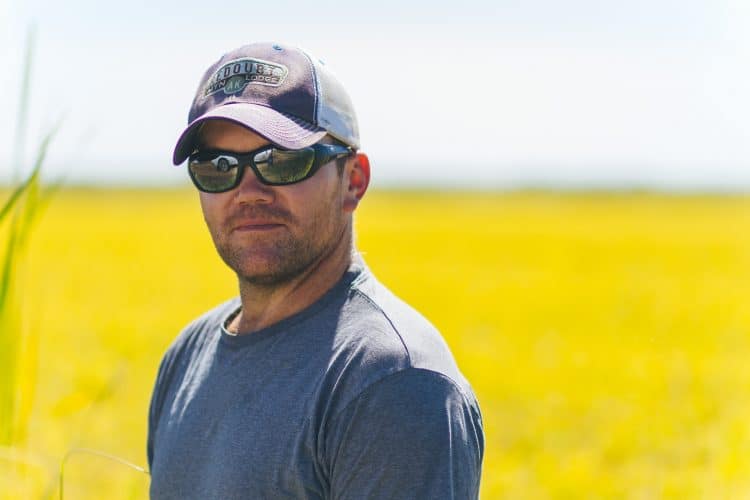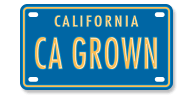Meet a Farmer: Kurt Richter of Richter AG

Meet Kurt Richter, Vice President and Farm Manager for Richter AG in Northern California. As a fourth generation farmer, he’s proud of his family’s commitment to environmental friendly farming practices.
Learn more about Kurt, why he left his broadcasting career to become a farmer and why he believes it’s important for farmers to be good stewards of the land.
CA GROWN: Tell us about the history of the company and your role in farming.
Kurt: This is my family’s company and we grow rice and row crops, mostly processing tomatoes. I’m the Farm Manager for the rice side of things primarily. The Richter family immigrated here from Germany in the 1800s and started out as dairy farmers in the Maxwell area. My grandfather started farming rice in the 60s as a small operation and my dad took over and expanded it into what it is today. Now I’m here to help him run it as technically a fourth generation farmer, but I’m really a third generation rice farmer. We have an ownership stake in a rice, drying and storage facility called Ridgetop Warehouse and that started in the 90s. We wanted to build our own dryer and store our own rice and vertically integrate deeper into the rice industry. So about five years ago, there was a next step in that process where a lot of the owners from Ridgetop Warehouse joined with others to start California Heritage Mills, which is a rice mill just outside of Maxwell that’s been doing very well now for the last five years.
CA GROWN: What does a typical day look like for you?
Kurt: It depends on the season, but right now we’re fully planted so I’m out checking the fields throughout the course of the day and there’s a lot of acres to cover. I’m just checking for sand establishment and wheat pressure and determining what needs to be the next step in the process, which is spraying the fields for weeds. I’m monitoring that, making notes, coming up with a spray plan for each field and making little decisions along the way to give the crop the best shot.
CA GROWN: What drew you into farming?
Kurt: I had another career first. I grew up around farming, but by the time I was in high school, I started thinking about what I wanted to do with my life and I wanted to get out of the area to experience new things. So, I worked in television broadcasting for about 13 years and traveled all over the U.S. It was an industry that changed a lot from when I first started. The internet was a major contributor to that and it was changing in ways that I really didn’t like. It’s an ad revenue driven industry and because ad revenues were decreasing and budgets were getting smaller, the skill and talent of my co-workers was also decreasing. I really didn’t want to be a part of it anymore and I had this unexplainable draw to want to come back to this area and farm. I thought about it for a few years before I said anything and then I mentioned it to my dad one day and he told me he was about to expand the company and said it would be a great time for me to get back in because he would need the help. So, I’ve been back here for five years now.
CA GROWN: What’s it like working with your family?
Kurt: I think it’s easy because we all know each other really well, care about each other and we all want to do a good job. I think a lot of people cringe at the idea of working with their families, but I find it to be pretty easy. The thing with farming though is that it’s also very independent and that’s something that was important to me. That was one of the aspects in my previous career that I was really unsatisfied with because I didn’t have the ability to be independent. With this job, I have my fields and it’s up to me to make sure everything goes smoothly. We have very open lines of communication between me and my other family members that work in the business, we have some great employees and it’s definitely been a satisfying experience for me.
CA GROWN: What are some ways your company gives back to the community?
Kurt: We try to regularly participate in a lot of different conservation programs and the number one on that list is a Nature Conservancy program that is offered every year. Being environmentally conscious is important to us because we have a lot of practices that we implement in the field that we know are beneficial to wildlife. For example, we leave the edges of the fields un-mowed so that it’s a nesting habitat for birds and we’ll hold our water a little later into the spring so that it’s a habitat for water fowl or shorebirds that are nesting at the time. We try to do as many of those little things as we can because we’re sharing this space with nature. We want nature’s needs met as much as we want to meet our own needs as farmers.
CA GROWN: What are your hobbies or pastimes when you’re not farming?
Kurt: Ever since I became a parent, that’s pretty much become my hobby. I have a three-year-old son and I spend almost all of my non-working time with him doing whatever he wants to do. He likes to go to the park and play and he likes to come out to the fields with me sometimes too. Prior to that I did a lot of video production type of stuff as a hobby, but I haven’t done as much of that lately because I haven’t had the time. I’m also a swimmer, so I try to swim anywhere from three to six days a week depending on the time of the year. I’ve had goals of trying to get back into doing a little bit of competitive swimming, but again finding time for that has been a challenge.
CA GROWN: What’s the most rewarding part of your job?
Kurt: Watching the crop grow and experiencing harvest. Your entire summer is dedicated to watching these rice plants grow and go through tough times and you do everything you can along the way to give them their best shot at being really healthy plants. Then harvest time comes around, you get your yield numbers and you get to see the outcome of your work. Then you see all the rice grains getting picked up by the harvesters and dumped into the trailers and shipped away and you get your lot reports with your yield numbers. The entire experience of watching the life cycle of a rice plant is what I find most rewarding.
CA GROWN: What is something that’s unique about your business or makes it stand out?
Kurt: I think there’s a lot of farmers that try to do things the way that we do with vertical integration and being environmentally conscious. We try to be as conscientious as possible and that’s really the core of our identity. With sustainable farming practices, we try to be as conservative as possible with water use, leaving positive nutrients in the soil and trying to be good stewards of Mother Earth while we maximize our farming opportunities.
CA GROWN: What advice would you give to someone who wants to become a farmer?
Kurt: Spend as much time in the fields as you can. There’s a lot that can be learned from studying and learning the science of it all, but I don’t think there’s anything that can compete with hours and hours of time in the field watching the process and learning from it. Find a way to get yourself out on the field with a farmer, whether it’s shadowing them or working for them so you can observe and pick up as much as you can. There’s plenty of farmers out here with decades of experience and we can all learn a lot from them. I feel like that’s been the most beneficial way for me to grow as a farmer as well.
CA GROWN: What has contributed to your past success and what are you doing to ensure success going forward?
Kurt: Maintaining our reputation for being good people with good farming practices that try to take a smart approach to farming. That has created a lot of opportunities for us in the past and will continue to create them for us. We’ll continue to hold ourselves to a high standard and the opportunity to grow will present itself at some point.
CA GROWN: As a California farmer, we know that you have a long list of activities you undertake on your farm to care for the land and its resources. What are one or two ways that you’re most proud of or you feel are innovative ways you care for your land?
Kurt: I think there are a lot of lessons for us to learn coming out of the California drought that we’ve had the last two years. A big lesson is that there are finite resources that we have to work with and it was water in this case. We have a lot of regulations imposed on us by the state as a result of that drought and as rice farmers, that includes a no-spill policy where we can’t spill out of the bottom of our fields which means you take in a smaller head of water at the top of your fields and you only take in as much as the rice consumes. We also have to maximize our land leveling so that we don’t have low spots in the field that accumulate unnecessary amounts of water. We use the latest in GPS technology to level our fields as close to perfection as possible, which allows us to use as little water as necessary to produce a crop. I think having an awareness of the precious resources we need to have in order to do our job and implementing practices on our own that are separate from what the state is imposing on us will only make things better.
